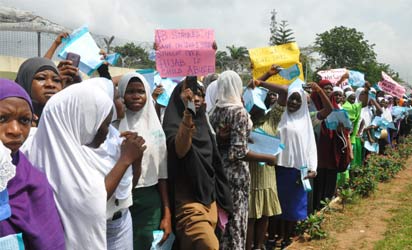Justice Falola’s judgment distorts the principle behind introduction of uniforms in schools
The proactive measures taken by the Department of State Services (DSS) in Osun State to stem the looming crisis over the accepted uniform in the secondary schools is commendable. Justice Jide Falola of the state high court had ruled that wearing of hijab to school is a fundamental right of Muslim students.
The judgment has expectedly provoked a fresh row between the Muslim and Christian communities in the state. While the Christians see it as an affront, especially when schools established by them are involved, the Muslims have lauded the verdict. They challenged whoever found it unacceptable to approach higher courts.
The invitation to the groups by the DSS indicates that the matter should not be handled with levity. Already, the Christian Association of Nigeria (CAN) has directed Christian students to defy the school uniform code by wearing robes to school as soon as effect is given to Justice Falola’s judgment. We find it unfortunate that young minds are being polluted at a time when we should be emphasising things that unite us, rather than those that divide us. It is even the more difficult to appreciate what has stoked this fire in a state in the South west, an area noted for religious understanding.
The Falola judgment is puzzling. What has human right got to do with the dress code adopted by organisations? Do police women wear hijabs? Do judges? They do not because there are codes to which they are expected to subscribe. Those who subscribe to Justice Falola’s perspective have argued that the students would only wear half hijab. To this we respond that a distortion is unacceptable. Once it is allowed on the ground that it is a fundamental right, there is no limit to the absurdity that could be introduced.
We cannot pretend, as a nation, to be oblivious to developments on the global stage. Terror attacks have forced an outright ban on the wearing of such covers in France. And, in Nigeria, most suicide bombers in the North East are young ladies and girls covered up in full hijab. Security concerns should teach us that this is not the way to go. Besides, it is a notorious fact that examination cheating is rife in our schools. The trend is likely to increase if hijabs are allowed and the person behind the veil is unknown.
There are enough complications in Nigeria already; it will be unwise to introduce more.
Justice Falola should have realised that the practice of law cannot be taken outside the social context. Where there is chaos, one of the first victims is the justice system. This judgment is not only likely to ignite fire in the state; it could spread to neighbouring states.
The Falola verdict cannot stand and should immediately be appealed. Where the Christians decide to adopt passive resistance, it should be seen as their right. This is a time to build a stable Nigeria, not one for self-serving judgments. Governor Rauf Aregbesola should be dispassionate in handling this delicate development. He should immediately activate dialogue with all groups and get them to sheathe their swords and submit to the Rule of Law. But we see nothing wrong with peaceful protest, even as the Christians have promised to test the judgment at the Appeal Court.



